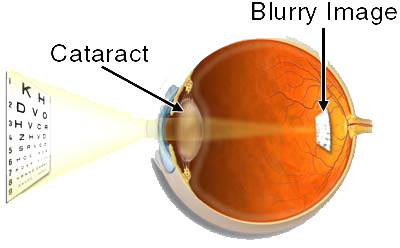Cataracts
What causes cataracts?
What are the symptoms?

What can be done?
Early cataracts often make you more short-sighted, which in the early stages can be compensated for by altering the prescription of your spectacles. Tinted lenses or shielding your eyes from the sun may also help. However, the benefit is usually only short-lived as the cataract continues to progress and the symptoms increase. At this stage the most effective treatment for cataracts is a simple operation to remove the cloudy lens. Your optometrist will advise you when you need to be referred to your GP or hospital. Cataract surgery is one of the most common surgical procedures and in most cases can be carried out under local anaesthetic on a day-case basis, without an overnight stay in hospital. Diets or drugs have not been shown to slow or stop the development of cataracts.

What is a lens implant?

